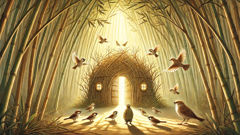Introduction
In the gentle cradle of ancient Japan, where bamboo forests rise and sway with the passing winds and tiny streams thread the earth like silver veins, the world moved at the pace of the seasons. Here, villagers lived with quiet purpose, tending rice fields that shimmered under the sun and breathing in the green hush of the woods. At the very edge of such a village, in a weathered cottage with a mossy thatched roof, dwelled an old man and his wife. Though their house was simple and their lives humble, the old man greeted each morning with a bowed head of gratitude, the dew cool beneath his bare feet as he swept the path or weeded his garden. He was known for his patience—how he paused to watch the dragonflies flit or coaxed shy wildflowers to bloom beside their door. His wife, however, was another matter. She wore her days tightly knotted about her, her voice sharp as winter wind, her eyes quick to narrow at the world’s smallest slights. Theirs was a marriage of habit, one shaped more by the grind of necessity than the softness of affection. And yet, as is often the way of old stories, it was in this quiet and sometimes troubled home that fate would plant a seed—a story that would unravel with the flutter of a sparrow’s wing. The tale of the tongue-cut sparrow, whispered through generations and carried on the hush of dawn, begins not with great deeds or grand fortune, but with a simple act of kindness that changed everything.
The Sparrow’s Rescue
Morning in the village was gentle, with dew still clinging to the leaves and the sky painted a tender, pearly blue. The old man rose as he did every day, sweeping the stone path with slow, thoughtful movements. He watched as sparrows darted through the air, chirping, scattering at his approach. But this morning, a faint sound—smaller than a sigh—caught his ear. Nestled in the grass, wings trembling, was a tiny sparrow, its feathers mottled and one leg tucked at an awkward angle. The old man’s heart, always tuned to the small hurts of the world, fluttered in sympathy. Crouching low, he murmured soft words as he reached out. The bird did not flee; instead, it looked up, its black eyes bright with pain and hope. Cradling the sparrow in his weathered hands, he saw a ribbon of red on its wing—a wound from some sharp-toothed beast or perhaps a tangle in the thorns. He carried it inside, cupping it as if it were spun glass. The old woman scowled when she saw what he held. “Why do you trouble yourself with useless things?” she snapped. “We have work to do and little enough to eat.” But the old man would not be swayed. He mixed a poultice of herbs and rice gruel, coaxing the sparrow to eat, cleaning its wound with gentle fingers. Days passed. The sparrow grew stronger, its song returning—a sweet, trilling melody that filled the cottage with unexpected warmth. The old man smiled each time it chirped. He’d speak to it as he weeded the garden or mended his tools, telling it tales of the forest and listening as it seemed to answer in its musical tongue. But his wife’s patience wore thin. Each mouthful the sparrow ate was, to her, a morsel stolen from their own meager pot. Her eyes narrowed, and her words grew sharper. One gray morning, as the old man walked to the village market, the woman’s anger snapped. She cornered the sparrow by the window and seized it. “Useless creature!” she hissed. In her rage, she snipped off the sparrow’s tongue and hurled it into the forest, its wings beating in frantic terror. When the old man returned, the house was silent. The sparrow was gone. The old woman turned her back, refusing to speak. A chill settled in the old man’s heart, colder than any winter. He searched the woods for days, calling to the sparrow. The only answer was the wind in the bamboo. Grief pressed on him, heavy and silent. He worried not only for the little bird but for the coldness that had crept between him and his wife, the emptiness that echoed through their home.

The Journey to the Bamboo Grove
Time softened the old man’s sorrow but did not erase it. Each morning, he lingered by the forest’s edge, hoping for a flash of familiar feathers or a note of song. The world moved on: rice seedlings took root, cicadas sang, and the evenings glowed with fireflies. But the ache remained. Then, one afternoon, as he rested beneath a spreading maple, he heard a faint fluttering—an almost musical whisper woven through the rustling bamboo. Hope surged in his chest. He followed the sound deeper into the forest, his feet treading softly on moss and fallen leaves. The sunlight shifted to green-gold as the bamboo crowded thick and tall, their stalks creaking with every breeze. At last, he reached a small clearing where the world felt enchanted. The air shimmered with birdsong, and there, perched on a low branch, was the sparrow. Its wing had healed, though its song was now softer, shaped by its injury into something hauntingly beautiful. Around it flitted dozens of sparrows, each bright-eyed and curious. The old man bowed low in gratitude and joy. The sparrows—his own rescued friend among them—beckoned him forward. He followed deeper still until he reached a tiny house woven from twigs and grass, lanterns glowing at its eaves. The sparrows chattered and danced, ushering him inside. He found himself an honored guest at their feast: tiny rice cakes, fruits glistening with dew, acorns roasted over a miniature fire. The sparrows performed a dance, wings shimmering in the candlelight. They chirped songs of thanks, their voices blending into music that made tears prick the old man’s eyes. When dusk fell, the sparrows gathered at his side. His friend, the little sparrow with the scarred tongue, hopped forward and presented him with two baskets—one small, one large. "Please, honored friend, take one home as our gift," it chirped softly. The old man, ever modest, chose the smaller basket. He thanked the sparrows and made his way back through the bamboo, the basket light in his hand and his heart full. At home, as the first stars appeared, he set the basket before his wife and opened it. A gasp escaped their lips: inside shimmered gold coins, pearls like captured moons, silks that glowed with secret colors. They had never seen such riches. The old woman’s eyes flashed, not with joy but with hunger—a greed that lit her from within. She pressed the old man for every detail, her mind already racing ahead.

The Greedy Wife’s Fate
That night, the old woman could hardly sleep. She tossed and turned, her mind burning with images of gold and silk. When dawn broke, she made up her mind: she would seek out the sparrow herself and demand a greater reward. Ignoring the old man’s gentle protests, she set off into the forest, her steps hurried and impatient. She pushed through brambles and bamboo, calling in a voice that brooked no argument. At first, the forest seemed to resist her; branches snagged her sleeves and roots caught her sandals. But eventually, the sparrows appeared. They did not chirp with welcome but watched warily from above. Still, they led her to the same palace of twigs, where the lanterns flickered and shadows danced. The little sparrow—her husband’s friend—stood at the door, its eyes wary but polite. The old woman feigned sweetness, bowing low and demanding, "Where is my gift? I nursed you too!" The sparrows conferred in whispers, then presented her with two baskets: one small and one large. Without hesitation, her hands shot out for the larger basket. Its weight thrilled her—a promise of even greater treasures than before. She didn’t wait to thank them or share a word of gratitude; she turned on her heel and hurried back toward home. The forest seemed to darken as she left, but she paid no mind. Once inside their cottage, she bolted the door and tore open the basket’s lid. At first, she glimpsed gold—but then snakes coiled and hissed, centipedes writhed, and ghostly shadows leapt out. The riches were illusions; what remained was terror and pain. The old woman shrieked as the creatures scattered through the house, and she fled into the night, leaving behind all thoughts of wealth. The old man found her at dawn, shivering by the riverbank, her eyes haunted and her spirit humbled. He wrapped her in his old coat and led her home, saying nothing of riches or revenge. In time, the snakes and shadows faded, but the memory remained. The couple returned to their quiet life—now marked by a gentler peace. The old woman learned gratitude, helping her husband tend the garden and sharing what they had. And sometimes, in the hush of evening, a sparrow’s song drifted down from the bamboo: a melody shaped by hardship, carrying a lesson as old as the hills—kindness brings joy, while greed breeds only sorrow.

Conclusion
The tale of the tongue-cut sparrow lingers in the hearts of all who hear it, a gentle reminder echoing through generations. In that quiet Japanese village, where bamboo bends to every wind and streams murmur beneath mossy stones, kindness shaped destiny more surely than any coin or treasure. The old man’s compassion—offered without thought of reward—brought forth gratitude and unexpected joy, weaving his life into the quiet music of nature. His wife’s greed, by contrast, summoned only fear and loss, teaching her in the end that true riches come not from gold or pearls but from gentleness and humility. As the seasons wheel onward and new voices take up the story, the lesson remains as clear as the sparrow’s song: in every act of kindness, however small, there lies a seed of happiness, ready to blossom in the hearts of those who choose mercy over selfishness. And so, in every corner of the world—wherever sparrows sing at dawn—this story endures, gently urging us all toward wisdom and grace.













